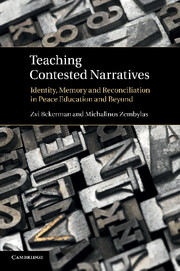Book contents
- Frontmatter
- Contents
- Acknowledgments
- Permissions
- Part I Introduction and theoretical underpinnings
- Part II Living and teaching contested narratives
- 4 Victims and perpetrators
- 5 (Im)possible openings
- 6 The everyday challenges of teaching children from conflicting groups
- 7 The emotional complexities of teaching contested narratives
- Part III Mourning, forgiveness and reconciliation
- Part IV Conclusions
- References
- Index
7 - The emotional complexities of teaching contested narratives
Published online by Cambridge University Press: 05 December 2011
- Frontmatter
- Contents
- Acknowledgments
- Permissions
- Part I Introduction and theoretical underpinnings
- Part II Living and teaching contested narratives
- 4 Victims and perpetrators
- 5 (Im)possible openings
- 6 The everyday challenges of teaching children from conflicting groups
- 7 The emotional complexities of teaching contested narratives
- Part III Mourning, forgiveness and reconciliation
- Part IV Conclusions
- References
- Index
Summary
Emotions are an important component of historical consciousness and ethnohistorical practices (Harkin, 2003). Extreme negative emotions evoked by traumatic historical events, as Harkin explains, strongly shape collective narratives and memories. “Memory,” as LaCapra (1998) argues, “poses questions to history in that it points to problems that are still alive or invested with emotion and value” (p. 8). Understanding contested narratives, then, requires comprehending emotion and its cultural components. While there is strong evidence of how emotions accompany historical matters (Ahmed, 2004; Svasek, 2006), there have been few sustained investigations in the field of education concerning how and with what implications emotions are mobilized and performed in the classroom as a crucial site of power, control and identification. In other words, it is valuable to examine how affective rituals of identification, affiliation and belonging in schools emerge as emotional training technologies of the nation-state project. The focus on the emotion as a strategic site of nation-state governance illuminates the ways in which the relation between collective narratives and individual experiences has been fundamental to ethnicized and racialized communities (Zembylas, 2010b, 2010c, 2010d). Needless to say, educational research on collective narratives in schools has tended to leave emotions in the margins or, at best, regard them as epiphenomena rather than as constitutive components in teaching practice (Zembylas, 2008a).
In this chapter we present an in-depth analysis of two examples – again, one from Israel and one from Cyprus – that show the emotional complexities encountered by teachers and students when dealing with contested narratives. The first example is based on a classroom activity in a bilingual school in Israel and it addresses the death of Yasser Arafat, the past iconic President of the Palestinian Authority; the second example is based on a series of lessons on peaceful coexistence conducted by a high-school teacher in a classroom comprising only Greek Cypriots but in a school in which Turkish Cypriots are also enrolled. These examples are representative of similar ones that we came across in the last ten years of our research in schools. We have selected these particular examples because they expose best and most clearly the emotional complexities involved in teaching about contested issues. But before describing the two examples, it is important to briefly outline the links among emotions, politics and history teaching.
- Type
- Chapter
- Information
- Teaching Contested NarrativesIdentity, Memory and Reconciliation in Peace Education and Beyond, pp. 114 - 132Publisher: Cambridge University PressPrint publication year: 2011



